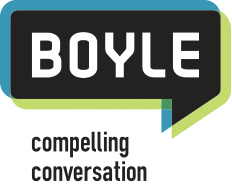Stop Proposing and Start Delivering: The End of Marketing and PR Proposals

We were thrilled recently when HubSpot’s “agency-whisperer” Jami Oetting wrote about our alternative approach to submitting proposals to prospective clients. She’d contacted me after I’d left a comment on one of her blogs (proof for both blog authors and readers that blogs can be great for initiating conversations).
This particular conversation led to Boyle Public Affairs’ preferred method of helping companies and organizations to determine the type of marketing communications support they need and the right agency to execute it.
Simply put, we’ve been in our clients’ shoes before as the communications directors of companies, non-profits and government agencies and we know that choosing an agency is a BIG investment in time, money and resources. An agency that doesn’t deliver or pursues the wrong strategy can seriously delay or diminish their client’s success. So, basing the agency selection on an introductory meeting and a generic proposal (or one founded largely on guesswork) is courting disaster.
From the agency’s perspective, the high cost of developing proposals to fill the standard 60% churn rate of clients suggests it is long past time for a better method of winning accounts that last.
For all of these reasons, we encourage prospective clients to take advantage of our 30-day “test drive” to get to know us and more importantly, to receive some real deliverables upon which they can judge our value. During this time, they get answers to critical questions like:
* Are we asking the right questions to really get to know their business and target market?
* Is our methodology sound and are our services and reporting transparent?
* Are our insights valuable and our skills and experience aligned with their needs?
* Does our team inspire creativity and collaboration with their team?
For our part, at the conclusion of the 30-day trial, we’re able to develop a proposal that is far more accurately attuned to the client’s priorities and resources. So, rather than guessing what they need and can afford, we can recommend a strategy and tactics that are designed to give them the most bang for their bucks.
There is a cost for this 30-day trial (roughly one-third of our standard cost per hour), but this is primarily so the prospect will value the process enough to participate fully in it. Our experience has been that this establishes mutual respect for each other’s time and mutual desire to build a foundation for a longer term relationship.
This is an approach we’re urging all agencies to adopt and all prospective clients to request. Rather than clinging to a system that has, for decades, left clients and/or agencies disappointed and frustrated, it’s time for the proposal process to evolve into one that is in both parties’ interests.
